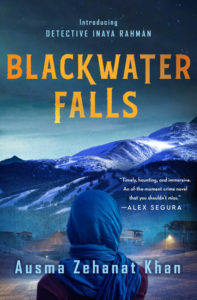 This book opens with a bang and doesn’t let up. A young woman is found crucified on the door of the local Evangelical Church in Blackwater Falls, Colorado. The dead woman, Razan, is a Muslim, which brings in Denver’s Community Response Unit, or CRU, who are called in on cases of racial sensitivity. The squad is headed by Lt. Seif, but the book centers on one of his officers, Detective Inaya Rahman. The local sheriff is annoyed that his case is being preempted by the CRU and does his best to be unhelpful.
This book opens with a bang and doesn’t let up. A young woman is found crucified on the door of the local Evangelical Church in Blackwater Falls, Colorado. The dead woman, Razan, is a Muslim, which brings in Denver’s Community Response Unit, or CRU, who are called in on cases of racial sensitivity. The squad is headed by Lt. Seif, but the book centers on one of his officers, Detective Inaya Rahman. The local sheriff is annoyed that his case is being preempted by the CRU and does his best to be unhelpful.
Despite the beauty and apparent idyllic nature of Blackwater Falls, there are tensions, changes and shifts under the surface. The community is home to many Muslim refugees and they aren’t welcome, appreciated, or understood everywhere. Detective Rahman is a Pakistani who has left her previous job because things went south after a traumatic incident, and she and her family have all made the move. Her father is extremely supportive; her traditional mother is looking for a groom.
Khan tackles a lot in this book which for all intents and purposes is simply a police procedural. Because of recent issues with police, the turn in perspective that Khan brings to the story makes it both a more profound reading experience as well as a more complicated one. Much of it centers on the culture of immigrant families who are afraid to speak up – the father of the dead girl has been injured in the meat packing plant where he works, but he doesn’t want to make a fuss.
It appears there are also two missing Somali girls. The families had gone to the police but the police insist the two girls are runaways, and their parents do not want to make a fuss either. However, local activist and attorney Areesha Adams is sure they are not simply runaways, and insists the CRU follow up. Inaya’s partner is Catalina Hernandez, another immigrant. While the two women have had different experiences, they also understand both each other and the communities they are trying to assist.
There are layers and layers to this beautifully rendered story. There’s an Evangelical biker gang; there’s the pastor and huge congregation of the local Evangelical church, the pastor’s sermons inciting members of his congregation to unfortunate action; and there’s the sheriff, who seems to have his hand in every pie. Inaya’s past is illuminated, as is the painful incident that caused her to leave her previous job in Chicago. This incident was so painful to read about – and the way Khan insists the reader experience it with her – that I actually had to set the book aside for a bit. Inaya’s trauma is similar to one experienced by Razan.
The sensitive and illuminating way that Khan writes about and illustrates the Muslim culture and the way “ordinary” Americans react to this culture in a time that is fraught with division as well as racial hatred and suspicion makes this book not just a good read, it’s a must read. The characters, the story, even the beautiful setting, pierced by violence and hatred, form a tapestry that’s impossible to look away from. The hatred and violence are balanced by the sense of community felt from Inaya’s culture to her faith to the ties of the families who have lost family members. This is definitely one of the reads of the year.